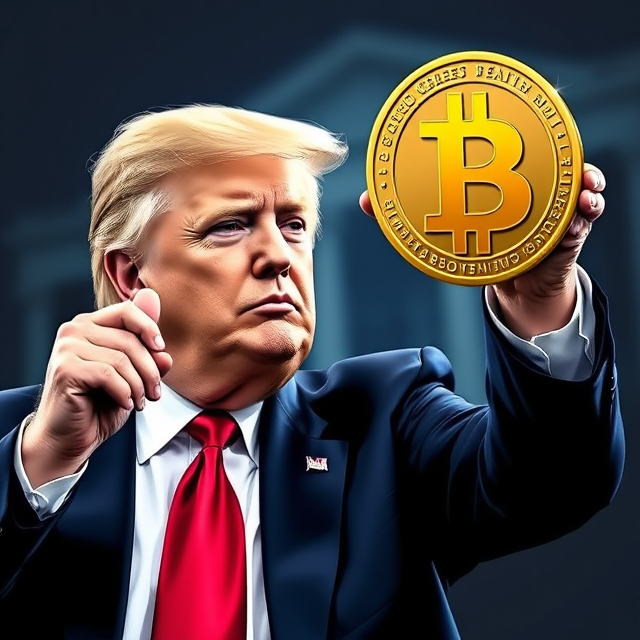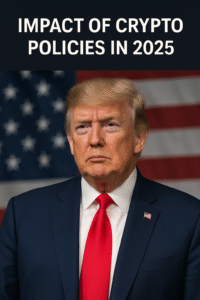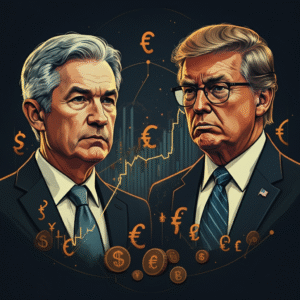Cryptocurrency has become a major topic in the world of finance. It is changing how people think about money and transactions. Unlike traditional money, cryptocurrencies like Bitcoin and Ethereum work without banks or governments. They use technology called blockchain, which makes transactions faster, cheaper, and more secure.
Over the past few years, cryptocurrencies have gained a lot of attention. Many businesses, investors, and even governments are starting to explore how to use them. However, not everyone is on board with this new form of money. Some, like Donald Trump, have expressed doubts about the value and safety of cryptocurrencies. They worry that it could challenge the traditional financial system and cause problems.
As cryptocurrencies continue to grow, the debate about their role in the global economy will keep evolving. The balance between innovation and regulation will play a big part in shaping the future of money.
The Rise of Cryptocurrency as a Key Financial Tool in the Global Economy
Cryptocurrency has become one of the most talked-about financial tools in the world. Starting as a small idea among tech enthusiasts, it has now grown into a global phenomenon. Cryptocurrencies like Bitcoin, Ethereum, and others have changed the way people think about money, transactions, and finance.
The main appeal of cryptocurrency is that it operates on a decentralized system. Unlike traditional money, which is controlled by banks and governments, cryptocurrencies run on blockchain technology. This system is secure, transparent, and does not rely on middlemen, making transactions faster and often cheaper.
As the technology has evolved, businesses, investors, and even governments have started paying attention. Cryptocurrencies are now used for various purposes, such as sending money across borders, creating digital contracts (smart contracts), and even fundraising for new projects. While some countries welcome these changes, others worry about risks like fraud, illegal activities, and the impact of mining on the environment.
Despite the challenges, cryptocurrencies are becoming a key part of the global economy. They offer new ways to store value, make payments, and build innovative financial systems.
Donald Trump’s Past Views on Cryptocurrency and His Approach to Digital Currencies
Donald Trump has had a skeptical and cautious view of cryptocurrency. During his presidency, he openly expressed concerns about Bitcoin and other digital currencies. In 2019, Trump made headlines when he said that Bitcoin and other cryptocurrencies were not real money. He also pointed out their use in illegal activities and warned about the dangers they might pose to the financial system.
Trump has been a strong supporter of the U.S. dollar and believes it should remain the most powerful currency in the world. This belief influenced his views on cryptocurrency, as he saw digital currencies as a potential threat to the dollar’s dominance.
During his administration, there were efforts to regulate the cryptocurrency market. Although Trump himself did not push for major policies, his government took steps to monitor and control digital currencies. For example, there were discussions about regulating stablecoins (cryptocurrencies tied to real-world assets) and cracking down on illegal activities tied to cryptocurrencies.
In recent years, Trump’s position on cryptocurrency has not been very clear. While he has not shown much support for digital currencies, he has also not made many public statements about them. What is clear is that his focus has always been on strengthening traditional financial systems and protecting the U.S. dollar’s role in global trade.
Cryptocurrency and Donald Trump’s views on it highlight the tension between old and new financial systems. As the world moves toward digital innovation, the balance between regulation, adoption, and security will continue to shape the future of money.
Trump’s Stance on Cryptocurrency
Donald Trump has long been skeptical about cryptocurrency, particularly Bitcoin and other digital currencies. From the beginning, he has expressed concerns about how cryptocurrencies could impact traditional financial systems, global markets, and even the U.S. dollar’s dominance. His statements reveal a cautious and often critical view of digital currencies, focusing on their potential risks rather than their benefits.
Historical Skepticism About Bitcoin and Other Cryptocurrencies
Trump has publicly criticized cryptocurrencies multiple times, particularly Bitcoin, calling it a threat to the U.S. dollar and global financial stability. In 2019, he tweeted that Bitcoin and other cryptocurrencies were “not money” and warned that they could facilitate illegal activities such as drug trafficking and money laundering. He also expressed concern about how cryptocurrencies could be used to undermine the dominance of the U.S. dollar in international trade and finance.
Trump’s focus on maintaining the strength of the U.S. dollar reflects his broader economic policy, which emphasizes protecting traditional financial systems and avoiding risks that could weaken the American economy.
Criticism of Cryptocurrencies Undermining the U.S. Dollar
Trump has made it clear that he believes digital currencies could challenge the dominance of the U.S. dollar, particularly in global trade and finance. He views this as a direct threat to American power and influence. In his view, cryptocurrencies could lead to greater financial instability and weaken the ability of governments to control economic policy through currency manipulation and monetary policy.
Trump’s support for the U.S. dollar has also been part of his broader “America First” agenda, where economic independence and protection of American interests have been key priorities. By opposing cryptocurrencies, Trump has aimed to protect the global standing of the dollar as a stable and dominant currency.
Potential Shifts in His Approach During His 2025 Presidency
While Trump’s views on cryptocurrencies have been consistently skeptical, there is speculation that his approach might evolve during a potential return to office in 2025. Given the growing importance and adoption of cryptocurrencies around the world, it is possible that Trump could shift his focus toward regulation rather than outright opposition.
If he were to win a second term, Trump might recognize the potential for cryptocurrencies to reshape finance and payment systems. Instead of outright rejecting them, he could take a more balanced approach, focusing on regulation to prevent misuse while supporting innovation that benefits the economy. His administration could introduce policies aimed at overseeing stablecoins, initial coin offerings (ICOs), and other aspects of the growing cryptocurrency market.
Ultimately, Trump’s stance on cryptocurrencies will likely remain cautious and focused on protecting traditional financial systems. However, the rapid evolution of digital currencies may lead him to adopt a more flexible and pragmatic approach to regulation, ensuring that innovation does not threaten American economic interests.
Regulatory Changes Under Trump’s Leadership
If Donald Trump were to return to the presidency in 2025, there would likely be significant changes in how cryptocurrencies are regulated in the U.S. Trump has historically expressed concerns about the risks associated with digital currencies, especially in terms of fraud, illegal activities, and the potential challenge to the U.S. dollar. With the growing use of cryptocurrencies, his administration would likely introduce tighter regulations aimed at ensuring greater oversight and control.
Stricter Regulations on Cryptocurrency Exchanges
Under a second Trump presidency, one of the most likely regulatory changes could be stricter regulations for cryptocurrency exchanges. These exchanges, where people buy, sell, and trade digital assets, have faced limited oversight in the past. Trump’s administration might push for stronger requirements on exchanges to ensure they follow anti-money laundering (AML) and know your customer (KYC) guidelines more closely.
Such regulations would aim to prevent cryptocurrencies from being used for illegal activities, such as money laundering or funding terrorism. They could also impose stricter reporting standards on exchanges, forcing them to monitor transactions more effectively and report suspicious activities to authorities.
Enhanced Scrutiny of Blockchain Technologies to Combat Fraud and Illicit Activities
Blockchain technology, the underlying framework for most cryptocurrencies, would likely face increased scrutiny under Trump’s leadership. While blockchain offers many advantages, including transparency and security, its anonymous nature can also be exploited for illegal activities, such as fraud, hacking, and money laundering.
Trump’s administration would likely prioritize enforcing stricter rules and audits on blockchain-based platforms to ensure they do not facilitate fraudulent behavior. This could include more rigorous investigations into decentralized applications (dApps) and smart contracts, both of which are built on blockchain technology. The focus would be on ensuring that blockchain systems are not being used for illicit transactions and that they comply with existing laws.
Impacts on Decentralized Finance (DeFi) and Stablecoins
Decentralized finance (DeFi), which allows individuals to access financial services without the need for traditional banks, could face challenges under stricter regulatory frameworks. Since DeFi operates without central authority or regulation, the Trump administration might introduce policies that force DeFi platforms to operate within a more controlled environment. This could include requiring DeFi projects to register with financial authorities and adhere to specific regulatory standards.
Similarly, stablecoins—cryptocurrencies pegged to real-world assets like the U.S. dollar—would likely come under closer government scrutiny. While stablecoins are viewed as more stable and less volatile than other cryptocurrencies, they still face concerns related to their backing, transparency, and potential for misuse. Trump’s administration might push for stronger oversight to ensure that stablecoins maintain proper reserves and do not destabilize the financial system.
Impact on the U.S. Dollar and CBDCs
If Donald Trump were to return to the presidency in 2025, his stance on cryptocurrency would likely continue to focus on protecting the U.S. dollar from the growing influence of digital currencies. Trump has long been an advocate for the strength of the dollar, and in response to the rise of cryptocurrencies, he may look for ways to ensure the U.S. dollar remains the dominant global currency. This could lead to new policies aimed at countering the potential challenges that digital currencies pose to the dollar’s position in the international financial system.
Trump’s Focus on Strengthening the U.S. Dollar Against Digital Currencies
Under Trump’s leadership, the U.S. government would likely prioritize measures to maintain the dollar’s dominance in global trade and finance. Cryptocurrencies, which operate independently of traditional financial institutions, present a challenge to the centralized control of money, something Trump has expressed concern about in the past. His administration might implement policies aimed at reducing the appeal of cryptocurrencies as a store of value or medium of exchange, particularly if they begin to threaten the U.S. dollar’s status.
Trump could push for international agreements or initiatives to strengthen the use of the U.S. dollar in cross-border transactions, while at the same time restricting or regulating the use of digital currencies. His administration might also continue to focus on maintaining low inflation and high interest rates, which would support the dollar’s value relative to digital currencies.
Additionally, Trump may explore using blockchain technology to enhance the U.S. dollar’s efficiency, security, and global appeal, all while safeguarding the dollar’s traditional role in the global economy.
Potential Acceleration of Central Bank Digital Currency (CBDC) Development in Response to Crypto Trends
As cryptocurrencies become more mainstream, many countries, including the U.S., have started exploring the concept of Central Bank Digital Currencies (CBDCs). These are digital currencies issued and regulated by central banks, offering the benefits of digital currencies without the volatility and risks associated with decentralized cryptocurrencies like Bitcoin.
Under a Trump administration, there could be an acceleration of CBDC development as a direct response to the growing use of private cryptocurrencies. A CBDC could provide the U.S. government with more control over its monetary policy, ensuring that it retains oversight of the money supply and payment systems. It could also help protect the U.S. dollar from being displaced by decentralized cryptocurrencies, offering a more stable and government-backed alternative for digital transactions.
CBDCs would also allow the U.S. to maintain its competitive edge in the digital economy, while preventing the rise of foreign digital currencies, such as China’s digital yuan, which could potentially challenge the U.S. dollar’s global supremacy.
By introducing a CBDC, Trump’s administration would seek to modernize the U.S. financial system, making it more efficient, transparent, and secure. This could involve pilot projects or gradual implementation, allowing the U.S. to carefully navigate the balance between innovation and regulatory control.
Global Crypto Market Reactions
Trump’s potential return to office in 2025 could have significant implications for the global cryptocurrency market. His policies on digital currencies, focused on regulation and protecting the U.S. dollar, could lead to both direct and indirect reactions from global markets. Given the interconnectedness of financial systems today, any major shift in U.S. policy regarding cryptocurrency would likely influence crypto prices worldwide.
How Trump’s Policies Might Influence Global Cryptocurrency Prices
Trump’s policies, which are expected to focus on stricter regulation and limiting the growth of cryptocurrencies, could cause volatility in the global crypto market. If his administration imposes tighter regulations on U.S.-based cryptocurrency exchanges or restricts the use of cryptocurrencies for illegal activities, it could lower investor confidence in digital currencies, potentially driving down prices.
Additionally, any statements or actions by Trump aimed at bolstering the U.S. dollar against cryptocurrencies could lead to increased demand for the dollar and decreased demand for digital currencies. If Trump strengthens the dollar’s position in global trade or focuses on promoting the use of traditional banking systems, cryptocurrencies might face greater pressure to prove their value.
However, if Trump’s policies are more balanced and focus on clear, transparent regulations rather than outright opposition, this could create a more stable environment for the crypto market, possibly mitigating extreme price fluctuations. A more regulated market might lead to institutional investments in cryptocurrencies, stabilizing prices in the long run.
The Reaction of Major Crypto-Holding Nations like El Salvador, China, and Russia
El Salvador
El Salvador made global headlines by becoming the first country to adopt Bitcoin as legal tender in 2021. The country’s president, Nayib Bukele, has championed the use of Bitcoin as a way to boost financial inclusion and attract foreign investment. However, if Trump’s policies were to negatively affect the global crypto market or impose tighter regulations on cryptocurrencies, El Salvador might face challenges. The country could experience fluctuations in Bitcoin’s value, affecting its economy, especially if the U.S. takes a tough stance on digital currencies.
El Salvador would likely have to adapt to new U.S. regulations, either by seeking international alliances to continue using Bitcoin or by rethinking its position as a crypto-forward nation. This could lead to tensions between the U.S. and El Salvador, especially if Trump’s administration enforces policies that directly target the use of Bitcoin or other cryptocurrencies.
China
China has already taken a firm stance against cryptocurrencies, banning Bitcoin mining and restricting cryptocurrency exchanges within its borders. While Trump’s policies may align with China’s approach in terms of regulating or limiting cryptocurrencies, they could also lead to more competition between the two nations as they both seek to control the digital financial space. Trump’s potential push for a digital dollar (CBDC) might lead China to further accelerate its development of the digital yuan, strengthening its own digital currency agenda.
In response to Trump’s regulatory framework, China could further clamp down on cryptocurrency trading and mining, solidifying its position as an opponent of decentralized digital currencies. The global crypto market could see more geopolitical tension between the U.S. and China, especially if these two economic giants push competing digital currencies and influence global financial markets.
Russia
Russia’s government has expressed interest in adopting cryptocurrencies for trade and finance, despite taking a cautious approach to regulation. Russian officials have sometimes suggested that cryptocurrencies could be used to bypass international sanctions, making them an important tool for Russia’s financial system. If Trump’s administration takes a strong stance on regulating digital currencies and increasing oversight, Russia might push back by embracing more decentralized systems or focusing on developing its own digital currency.
A potential increase in global crypto regulations could force Russia to either align with international standards or continue developing alternatives to counter U.S. influence. Russia could also increase its mining operations in countries where crypto regulations are looser, or it might explore using cryptocurrencies as part of its broader efforts to challenge the Western financial system.
Opportunities for Blockchain Technologies
Despite concerns over regulation, blockchain technology still holds significant potential for innovation. Its ability to provide secure, transparent, and decentralized solutions could lead to major breakthroughs in several areas. Under Trump’s administration, blockchain could find support in secure voting systems, supply chain improvements, and even national security applications.
Blockchain in Secure Voting Systems
Blockchain could revolutionize voting systems by offering enhanced security and transparency. With blockchain, each vote could be recorded in an immutable ledger, making it nearly impossible to tamper with or alter. This could increase trust in election processes, ensuring that votes are counted fairly and accurately. Trump’s administration might explore the use of blockchain in federal and state elections to protect against fraud and boost confidence in democratic systems.
Blockchain for Supply Chain Improvements
Blockchain’s potential to improve supply chain management is another area that could gain traction under Trump. The technology allows real-time tracking of goods and products, ensuring that each item can be traced from its origin to the end consumer. This can help prevent fraud, reduce waste, and improve efficiency in industries like retail, healthcare, and logistics. Trump’s focus on American manufacturing and national security could drive investment in blockchain solutions to streamline supply chains and improve transparency.
Blockchain for National Security
Blockchain could also play a key role in enhancing national security. By creating decentralized, tamper-proof records, blockchain could help secure sensitive data, track military supplies, and safeguard communications. It could be used to improve cybersecurity and prevent unauthorized access to critical systems. Given Trump’s focus on national security, the administration could explore how blockchain technology can strengthen the U.S. military and government operations, providing a more secure infrastructure to protect against cyber threats.
Business Adaptations
If Donald Trump returns to the presidency in 2025, U.S. businesses involved in cryptocurrency will face stricter regulations and more oversight. His administration is likely to focus on financial rules to reduce illegal activities, such as fraud and money laundering. Cryptocurrency businesses will need to adjust to these changes while continuing to grow and innovate.
How U.S. Businesses Might Adjust to Trump’s Policies
1. Stronger Compliance Measures:
Cryptocurrency exchanges and businesses will have to follow stricter rules. This includes better customer checks (KYC), reporting suspicious transactions, and meeting anti-money laundering (AML) guidelines. These businesses will need to build stronger compliance teams to ensure they follow these new rules.
2. Legal Adjustments:
With new regulations, businesses may need to adjust their services to fit the changing laws. Some companies might have to change their business models to comply with tighter restrictions on how cryptocurrencies can be used and traded.
3. Focus on Regulated Services:
To stay legal, businesses might focus more on regulated services. Partnerships with traditional financial institutions could become more common, as it helps companies stay within the law and keep customers happy.
Implications for Crypto Startups and Large Blockchain Enterprises
For Crypto Startups:
- Higher Costs:
Startups may struggle to keep up with the cost of compliance. Smaller companies may find it harder to meet the strict financial and legal requirements. This could raise the cost of starting a new crypto business in the U.S. - Shifting Business Models:
To cope with regulations, startups may explore different markets or focus on specific niches. However, these areas may still face legal challenges under Trump’s policies, forcing startups to work within a more regulated space. - Mergers and Acquisitions:
As regulations increase, smaller startups may find it hard to compete with larger firms. This could lead to more mergers or acquisitions as small businesses partner with larger companies that have the resources to handle new regulations.
For Large Blockchain Enterprises:
- Operational Changes:
Larger companies in the blockchain space are better equipped to handle new regulations, but they will still need to adapt. This might involve changing their business models, especially if certain cryptocurrencies are restricted or banned under new policies. - New Partnerships:
Large companies may look to partner with traditional banks or financial institutions to help navigate the regulatory changes. These partnerships could make it easier for blockchain companies to operate legally and smoothly. - Legal Scrutiny:
Even the largest companies will face more legal scrutiny. They will need to ensure that their services comply with new laws, and they may need to work on lobbying efforts to influence the regulations that affect their business.
Public Perception of Crypto During Trump’s Tenure
The public perception of cryptocurrency during a potential Trump presidency would likely be divided, with both strong supporters and vocal skeptics. Trump’s stance on cryptocurrency—while focusing on regulation and maintaining the U.S. dollar’s dominance—could influence how the public views the space. His policies might create a mixed environment where both enthusiasm and concerns coexist.
Division Among Crypto Enthusiasts: Supporters vs. Skeptics
1. Crypto Supporters:
Many crypto enthusiasts believe that cryptocurrencies like Bitcoin represent financial freedom, decentralization, and independence from traditional financial institutions. These supporters may view Trump’s policies as a threat to the innovation and growth of cryptocurrencies, particularly if they involve heavy-handed regulation. However, some might also see it as an opportunity for the market to mature and become more legitimate. If Trump introduces clearer regulations or pushes for the adoption of Central Bank Digital Currencies (CBDCs), it could bring a sense of validation to the crypto space, as it would show that digital currencies are being taken seriously.
2. Crypto Skeptics:
On the other hand, crypto skeptics—who often argue that cryptocurrencies are unstable and prone to fraud—might support Trump’s approach. They could view his stricter regulations as necessary to protect investors and prevent illegal activities such as money laundering or fraud. These critics would welcome stronger government control to reduce the risks associated with cryptocurrencies and may believe that regulation is essential for long-term stability in the market.
Concerns About Potential Government Overreach in the Crypto Space
1. Fear of Overregulation:
A key concern for many in the crypto community is the fear of government overreach. Critics of Trump’s potential policies might worry that too much regulation could stifle innovation in the space. If the government imposes stringent rules on crypto exchanges or digital currencies, it could make it harder for new projects to launch, potentially stifling competition and the growth of the industry. The concern is that these regulations could lead to a more centralized system, undermining the core principles of decentralization that cryptocurrencies are built on.
2. Impact on Privacy and Freedom:
Many crypto supporters are deeply concerned about privacy, and they may see Trump’s approach to regulation as an infringement on individual freedoms. The idea of government tracking cryptocurrency transactions to prevent illegal activities might raise concerns about surveillance and the loss of financial privacy. Those who value anonymity and decentralized financial systems may view government involvement as a direct threat to the freedom that cryptocurrencies offer.
3. Potential for Innovation and Stability:
On the other hand, some might argue that regulation can bring much-needed stability to the cryptocurrency market. If Trump’s administration creates clear, well-structured regulations, it could increase investor confidence and encourage institutional participation. This could lead to a more stable market in the long term, which might appeal to some investors who have previously been hesitant due to the volatility of digital currencies.
Conclusion: What Lies Ahead
The future of cryptocurrency under Trump’s presidency will depend heavily on how the administration balances regulation with innovation. While Trump’s approach could bring more oversight to the crypto space, there are still significant opportunities for growth and stability. The key will be striking a balance between controlling potential risks and allowing for the continued development of new technologies and business models.
Balancing Regulation with Innovation in the Crypto Space
As Trump’s administration potentially introduces stricter regulations, it will be essential to ensure that these rules do not stifle innovation within the cryptocurrency and blockchain industries. Clear and well-defined regulations could provide the structure needed to protect investors and reduce illegal activities while still allowing companies to innovate and explore new opportunities in the digital finance space. The challenge will be finding the right level of regulation that ensures security without inhibiting the core values of decentralization and transparency that drive cryptocurrency innovation.
Long-Term Predictions for Crypto Under Trump’s Presidency
1. Stability Through Regulation:
In the long run, if Trump’s administration focuses on regulating the crypto market while ensuring compliance with legal standards, it could lead to more stability. Clear regulations would likely increase investor confidence, attracting more institutional investors and traditional financial institutions into the space. This could help stabilize the often volatile crypto market and promote its acceptance as a legitimate asset class.
2. Growth Opportunities:
Despite the potential for stricter oversight, there are ample opportunities for growth. Blockchain technology, in particular, offers a wide range of applications beyond just cryptocurrency. Innovations in supply chain management, secure voting systems, and national security could drive significant development in the industry. Trump’s policies could encourage investment in these areas, creating new industries and job opportunities while positioning the U.S. as a leader in blockchain innovation.
3. Increased Focus on Central Bank Digital Currencies (CBDCs):
Under Trump’s leadership, the U.S. might accelerate the development of a Central Bank Digital Currency (CBDC) as a response to the growth of decentralized cryptocurrencies. This could bring further legitimacy to digital currencies, allowing them to coexist with traditional financial systems. A digital dollar could become a significant part of the global financial ecosystem, providing stability and helping the U.S. maintain its position as a dominant player in the global economy.
In conclusion, while Trump’s policies may bring more regulation to the cryptocurrency market, there is still significant potential for growth and innovation. Balancing regulation with innovation will be crucial in ensuring that the crypto space can continue to evolve while maintaining investor protection and financial stability. With proper oversight, the long-term outlook for cryptocurrencies under Trump’s presidency could include a more stable and widely accepted market, providing new opportunities for growth and development across various industries.








